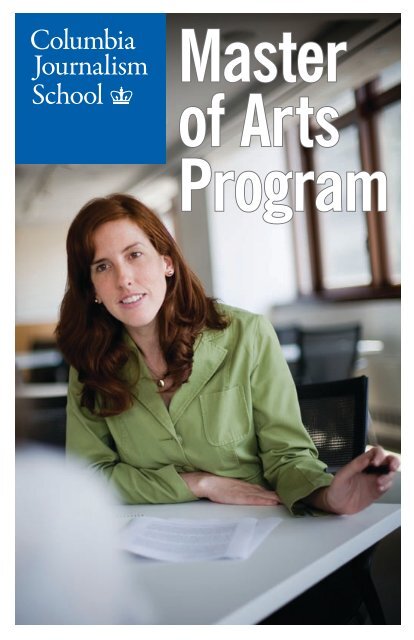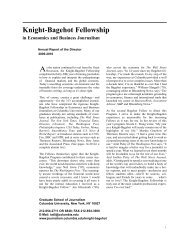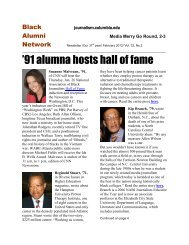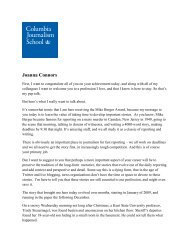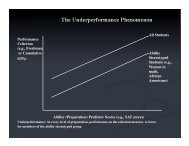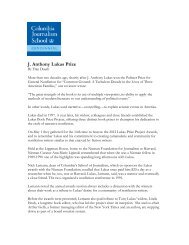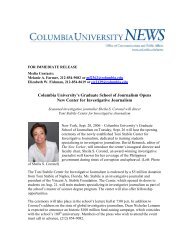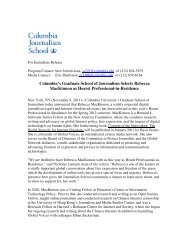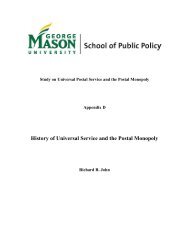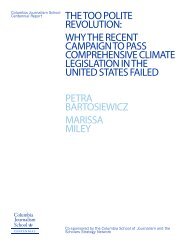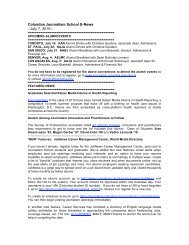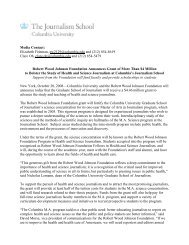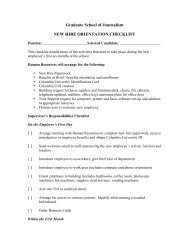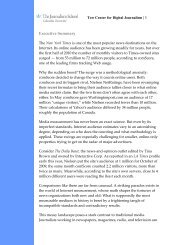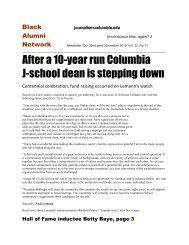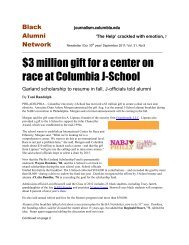The MA Program - Columbia University Graduate School of Journalism
The MA Program - Columbia University Graduate School of Journalism
The MA Program - Columbia University Graduate School of Journalism
Create successful ePaper yourself
Turn your PDF publications into a flip-book with our unique Google optimized e-Paper software.
<strong>Columbia</strong><br />
<strong>Journalism</strong><br />
<strong>School</strong><br />
Master<br />
<strong>of</strong> Arts<br />
<strong>Program</strong><br />
1
<strong>Columbia</strong>.<br />
Because <strong>Journalism</strong> Matters.<br />
To educate new generations <strong>of</strong> journalists<br />
and uphold standards <strong>of</strong> journalistic excellence<br />
has been the mission <strong>of</strong> the <strong>Columbia</strong><br />
<strong>University</strong> <strong>Graduate</strong> <strong>School</strong> <strong>of</strong> <strong>Journalism</strong><br />
since it opened nearly a century ago. <strong>The</strong><br />
quality, vitality, and innovation <strong>of</strong> our degree<br />
programs remain unsurpassed, providing the<br />
foundation for students not only to succeed,<br />
but to shape the future <strong>of</strong> journalism.<br />
<strong>The</strong> M.A.<br />
<strong>Program</strong><br />
A Specialized <strong>Journalism</strong><br />
Degree for Experienced<br />
Journalists<br />
<strong>The</strong> prestigious Master <strong>of</strong> Arts program,<br />
inaugurated in 2005, is for experienced<br />
journalists who wish to study a specific<br />
subject area, such as business and<br />
economics. Unlike the Master <strong>of</strong> Science<br />
program, which focuses on teaching basic<br />
reporting, the M.A. is designed to equip<br />
journalists with subject-area expertise, so<br />
that they may cover complicated issues in a<br />
sophisticated, nuanced manner. Students<br />
Haley Sweetland Edwards<br />
Freelance journalist, Middle East<br />
M.A. Politics, ’09<br />
“I left a reporting job at <strong>The</strong> Seattle Times<br />
to enroll in the M.A. program. In old-school journalism,<br />
that may have seemed an odd choice:<br />
journalists are advised to get on a ladder in the<br />
develop the knowledge that will allow them<br />
to situate news events in their larger context,<br />
to ask more informed questions, and to<br />
evaluate competing claims made by sources.<br />
<strong>The</strong> focus is on content as much as on<br />
skills, and the result is that the program<br />
imparts a deeper understanding <strong>of</strong> journalism<br />
and the many forms it takes.<br />
During the application process,<br />
candidates select a major in one <strong>of</strong> four<br />
subject areas: arts and culture; science:<br />
health and the environment; business and<br />
economics; or politics. Once enrolled,<br />
M.A. students work closely with pr<strong>of</strong>essors<br />
from both the <strong>Journalism</strong> <strong>School</strong> and<br />
academic departments and pr<strong>of</strong>essional<br />
schools throughout <strong>Columbia</strong> <strong>University</strong>.<br />
Each student also designs and completes a<br />
master’s thesis, an ambitious reporting<br />
project that results in a written piece <strong>of</strong><br />
8,000 to 10,000 words or its broadcast or<br />
online equivalent.<br />
<strong>The</strong> program is full time and runs from<br />
August through May.<br />
www.journalism.columbia.edu/maprogram<br />
workplace and start climbing. <strong>The</strong> M.A. program<br />
is a year away from that ladder. It allows you to<br />
question the foundations on which you build your<br />
reporting and pour yourself into a long-form project<br />
in a way you never could in a modern newsroom.<br />
<strong>The</strong> M.A. program is not another rung on a ladder;<br />
it’s a launching pad.”<br />
1
An Overview<br />
COUrSES<br />
<strong>The</strong> M.A. <strong>Program</strong> is full-time, and runs<br />
from August through May. <strong>The</strong> following is<br />
a description <strong>of</strong> the curriculum <strong>of</strong> a typical<br />
academic year.<br />
<strong>The</strong> Seminar in a chosen concentration,<br />
taken in both the fall and the spring semesters,<br />
is the most intensive part <strong>of</strong> the M.A.<br />
degree. Taught by members <strong>of</strong> the <strong>Journalism</strong><br />
<strong>School</strong> faculty and subject-area experts from<br />
<strong>Columbia</strong> and beyond, the seminars combine<br />
course readings, case studies, field trips, and<br />
visits with experts to provide expertise in the<br />
student’s chosen concentration.<br />
Evidence and Inference is a one-semester<br />
course that teaches advanced research<br />
techniques for journalists—skills in gathering<br />
and assessing information, <strong>of</strong>ten adapted<br />
from other areas <strong>of</strong> the <strong>University</strong>, which<br />
most working journalists don’t have but<br />
that are highly useful in journalistic work.<br />
<strong>The</strong>se include statistical literacy, rigorous<br />
interviewing techniques, understanding<br />
the work <strong>of</strong> experts, and locating material<br />
in historical archives and data bases. <strong>The</strong><br />
course also teaches a disciplined “journalistic<br />
method” <strong>of</strong> testing assumptions and<br />
hypotheses, recognizing ways stories can<br />
distort the truth and making sure that reporting<br />
firmly proves its points. A distinguished<br />
group <strong>of</strong> leading <strong>Columbia</strong> faculty from<br />
outside the <strong>Journalism</strong> <strong>School</strong> helps teach<br />
the course.<br />
A History <strong>of</strong> <strong>Journalism</strong> for Journalists<br />
provides an overview <strong>of</strong> American journalism<br />
from colonial days to the present. It empha-<br />
sizes the relationship between journalism<br />
and other institutions in a democracy,<br />
examining how the role <strong>of</strong> the press<br />
emerged, how it has changed, and how this<br />
role is similar or different from that in<br />
other democracies.<br />
Digital media courses are <strong>of</strong>fered as part<br />
<strong>of</strong> the M.A. curriculum. Each student has the<br />
option to enroll in a digital skills class during the<br />
fall semester. Topics include video and audio<br />
production, photography, and social media.<br />
Electives<br />
Each M.A. student takes three electives over<br />
the course <strong>of</strong> the academic year: one in the<br />
fall and two in the spring. Students may<br />
enroll in almost any graduate-level course<br />
throughout <strong>Columbia</strong> <strong>University</strong>, including the<br />
other pr<strong>of</strong>essional schools, provided it will<br />
deepen their understanding <strong>of</strong> the chosen<br />
area <strong>of</strong> study.<br />
Master’s <strong>The</strong>sis<br />
All M.A. students are required to complete<br />
a master’s thesis, a yearlong project jointly<br />
advised by a member <strong>of</strong> the <strong>Journalism</strong> <strong>School</strong><br />
faculty and a member <strong>of</strong> the <strong>Columbia</strong> faculty<br />
or a subject-area expert from outside the<br />
<strong>School</strong>. <strong>The</strong> result is an ambitious journalistic<br />
work <strong>of</strong> about 10,000 words or its equivalent<br />
in broadcast or online media.<br />
SAMplE M.A.<br />
COUrSE SCHEDUlE<br />
Fall Semester<br />
<strong>Graduate</strong> seminar in major<br />
Evidence and Inference<br />
History <strong>of</strong> <strong>Journalism</strong><br />
Elective<br />
Master’s thesis<br />
Spring Semester<br />
<strong>Graduate</strong> seminar in major<br />
Elective<br />
Elective<br />
Master’s thesis<br />
Dorian Merina<br />
Reporter/Anchor<br />
Free Speech Radio News<br />
M.S. ’07; M.A. Arts and Culture, ’08<br />
“<strong>The</strong> M.A. program was an opportunity to take<br />
a deeper look at what we do as journalists and<br />
how we do it. Evidence and Inference encouraged<br />
me to ask questions about how a story<br />
is framed, what is included, and how new<br />
Subject-Area<br />
Seminars<br />
ArTS AND CUlTUrE<br />
pr<strong>of</strong>essors: David Hajdu and Alisa Solomon<br />
This seminar aims to develop historical<br />
knowledge, analytical understanding, and<br />
nimble thinking about arts and culture<br />
across a range <strong>of</strong> disciplines. Through<br />
a combination <strong>of</strong> extensive reading, case<br />
studies, site visits, and teaching collaborations<br />
with scholars, artists, and other<br />
leaders in the arts, students consider the<br />
formal and emotional force <strong>of</strong> the arts as well<br />
as the ways they function as commodities<br />
in a global marketplace. Students also learn<br />
about policy and economic issues: private<br />
and public funding models, intellectual property<br />
law, and trade agreements. Students<br />
develop the skills, analytical habits, and<br />
flexibility to cover a wide range <strong>of</strong> stories,<br />
and work on becoming cultural reporters<br />
and critics in the fullest sense.<br />
technology is shaping news. It also taught me<br />
research skills, challenged and refined my<br />
interviewing techniques, and gave me the tools<br />
to approach specialized academic fields and<br />
primary documents. One highlight <strong>of</strong> the year was<br />
the courses I took outside the J-school. One course,<br />
in the Spanish Department, helped me research<br />
and write my thesis, which reported on a 19thcentury<br />
revolutionary figure in the Philippines.”<br />
BUSINESS AND ECONOMICS<br />
pr<strong>of</strong>essors: Sylvia Nasar and<br />
James Stewart<br />
<strong>The</strong> fall term stresses three attributes <strong>of</strong><br />
excellent economics reporting: a firm grasp<br />
<strong>of</strong> basic economic theory and institutions;<br />
hands-on knowledge <strong>of</strong> data for measuring<br />
economic performance and assessing<br />
the validity <strong>of</strong> economic arguments; and<br />
the ability to find and report compelling<br />
stories. <strong>The</strong> primary objective is to teach<br />
students simple, fast, and effective ways<br />
to break down complicated problems,<br />
locate relevant data, and compensate for<br />
inherent biases. <strong>The</strong> spring term provides<br />
students with the analytical skills to conceive<br />
and execute stories about the business<br />
sector. Academic subjects are not taught<br />
in the abstract but in the context <strong>of</strong> recent<br />
news. Students learn basic skills in accounting,<br />
corporate finance, securities law,<br />
securities analysis, and portfolio management,<br />
while the course is firmly rooted in<br />
the journalistic process.<br />
2 3
pOlITICS<br />
pr<strong>of</strong>essors: Thomas Edsall and<br />
Alexander Stille<br />
This seminar <strong>of</strong>fers a concentrated introduction<br />
to what a journalist needs to know about<br />
politics. It will provide a historical context for<br />
the main political systems and institutions,<br />
as well as a series <strong>of</strong> tools that reporters<br />
can use to analyze and understand stories<br />
and situations they may confront. This<br />
concentration is appropriate for candidates<br />
who want to be foreign correspondents,<br />
legal reporters, education reporters, city hall<br />
reporters, and political reporters. Across all<br />
<strong>of</strong> these domains, certain themes and issues<br />
recur, and this course is therefore organized<br />
around eight such themes: power; identity<br />
and nationalism; mobilization; collective<br />
action and social conflict; rights; institutions;<br />
the distribution <strong>of</strong> resources; and bargaining<br />
and negotiation. Student assignments will<br />
include exploring the manifestation <strong>of</strong> these<br />
forces in the greater New York area.<br />
Moises velasquez<br />
Environmental Reporter<br />
Christian Science Monitor<br />
M.S. ’05; M.A. Science: Health<br />
and the Environment, ’06<br />
“Pr<strong>of</strong>essor Marguerite Holloway led us fearlessly<br />
and enthusiastically through everything from<br />
quantum mechanics to human migrations out<br />
<strong>of</strong> Africa. And the classes I took outside the<br />
<strong>Journalism</strong> <strong>School</strong> have proven immensely<br />
important, especially one on climate science<br />
SCIENCE: HEAlTH AND<br />
THE ENvIrONMENT<br />
pr<strong>of</strong>essors: Marguerite Holloway and<br />
Jonathan Weiner<br />
Students in this seminar learn to see science<br />
in its widest perspective—from quarks<br />
and black holes to the quirks <strong>of</strong> the human<br />
genome and NASA’s travails. Experts take<br />
the class through some <strong>of</strong> science’s most<br />
compelling subjects, including contemporary<br />
physics, the ethics <strong>of</strong> public health, climate<br />
change, epigenetics, the history <strong>of</strong> industry,<br />
and trends in conservation biology. Students<br />
learn to deconstruct scientific studies and<br />
bolster science coverage with context,<br />
history, and the careful use <strong>of</strong> data. Students<br />
are also taught to use all <strong>of</strong> the tools <strong>of</strong><br />
narrative nonfiction to convey complicated<br />
concepts with force and energy. <strong>The</strong> field<br />
<strong>of</strong> science writing is changing explosively,<br />
and this course is designed to help our<br />
students hone lasting skills, adapt to its<br />
transformations, and shape its future.<br />
that I took at the Goddard Institute for Space<br />
Studies. I didn’t know it, but climate was<br />
about to blow up as a topic; I’m lucky I had<br />
some understanding <strong>of</strong> the basic science. Also,<br />
elements <strong>of</strong> the Evidence and Inference course<br />
have come in handy. Even the simple task <strong>of</strong><br />
learning the terms sociologists have for the<br />
various human biases has proven immensely<br />
helpful. You can’t change how you think until<br />
you know you’re thinking it.”<br />
Miriam Gottfried<br />
Reporter, Barron’s magazine<br />
M.A. Business and Economics, ‘09<br />
<strong>The</strong> Master’s <strong>The</strong>sis<br />
Students in the M.A. program must produce<br />
a master’s thesis—a sophisticated work <strong>of</strong><br />
long-form journalism—<strong>of</strong> about 10,000 words<br />
(or the equivalent in another medium). <strong>The</strong><br />
thesis is an integral part <strong>of</strong> the program,<br />
intended to give students the opportunity to<br />
explore a topic in depth and synthesize what<br />
they learn in a sophisticated manner. Ideally,<br />
the M.A. thesis balances the demands <strong>of</strong><br />
writing for a general audience with the need<br />
for thorough and nuanced journalism about<br />
complex issues. <strong>The</strong> thesis is advised by both<br />
a journalism pr<strong>of</strong>essor and a pr<strong>of</strong>essor or<br />
expert with a deep background in the<br />
subject covered by the thesis. With the help<br />
<strong>of</strong> these two advisers, the M.A. student sets<br />
out to complete the sort <strong>of</strong> work that an<br />
educated reader (or viewer, or listener) would<br />
consume with pleasure and that an expert in<br />
the field would deem informed and thoughtful.<br />
“After working in business journalism<br />
for several years, I was unsure about the value<br />
<strong>of</strong> journalism school. But when I learned about<br />
the M.A. Business concentration, I saw an<br />
opportunity to gain deeper technical knowledge<br />
<strong>of</strong> the financial world, which I lacked after<br />
an undergraduate degree in the humanities.<br />
I took accounting, corporate finance, and<br />
corporate strategy classes at the Business<br />
<strong>School</strong> and the <strong>School</strong> <strong>of</strong> International and<br />
Public Affairs. Pr<strong>of</strong>essors Nasar and Stewart<br />
showed us how to interpret economic data<br />
to become our own analysts. <strong>The</strong> skills I learned<br />
have unquestionably made me a more critical<br />
and confident reporter.”<br />
Justine Sharrock, ’07<br />
Sharrock came to the M.A. program from<br />
an editing job at San Francisco magazine.<br />
For her thesis, she explored a hot issue<br />
<strong>of</strong> the day: harsh interrogation tactics used<br />
by the U.S. military. But she took a unique<br />
approach, focusing on the experiences<br />
<strong>of</strong> the individual soldiers involved in these<br />
programs, and their bumpy reintegration<br />
when they returned to the United States.<br />
Her powerful piece was published—in<br />
only slightly condensed form—in the March/<br />
April 2008 edition <strong>of</strong> Mother Jones under<br />
theheadline “Am I a Torturer?” Sharrock’s<br />
book on this subject, Tortured, was<br />
published in June 2010.<br />
<strong>The</strong> prisons in Iraq stink. Ask any guard or<br />
interrogator and they’ll tell you it’s a smell<br />
they’ll never forget: sweat, fear, and rot.<br />
On the base where Ben Allbright served<br />
from May to September 2003, a small outfit<br />
named Tiger in western Iraq, water was<br />
especially scarce; Ben would rig a hose to<br />
a water bottle in a feeble attempt to<br />
shower. He and the other Army reservists<br />
tried mopping the floors, but the cheap<br />
solvents only added a chemical note to<br />
4 5
the stench. During the day, when the<br />
temperature was in the triple digits, the<br />
smell fermented.<br />
It got even hotter in the Conex<br />
container, the kind you see on top <strong>of</strong><br />
18-wheelers, where Ben kept his prisoners.<br />
Not uncommonly the thermometer inside<br />
read 135, even 145 degrees. <strong>The</strong> Conex<br />
box was the first stop for all prisoners<br />
brought to the base, most <strong>of</strong> them Iraqis<br />
swept up during mass raids. Ben kept<br />
them blindfolded, their hands bound behind<br />
their backs with plastic zip ties, without<br />
food or sleep, for up to 48 hours at a time.<br />
He made them stand in awkward positions,<br />
so that they could not rest their heads<br />
against the wall. Sometimes he blared loud<br />
music, such as Ozzy or AC/DC, blew air<br />
horns, banged on the container, or shouted.<br />
“Whatever it took to make sure they’d stay<br />
awake,” he explains.<br />
Barbara Kiviat, ‘06<br />
A business and economics reporter at<br />
Time, Kiviat completed the Business M.A. in<br />
2006. She found an unlikely subject for her<br />
thesis: an Alabama town that was poised to<br />
lose its Wal-Mart and was fighting to keep<br />
the much-maligned retail behemoth around.<br />
In the process, Kiviat also explored the<br />
Natasha Del Toro<br />
Producer, Time.com<br />
M.S. ’05; M.A. Arts and Culture, ’06<br />
“If it weren’t for my time at <strong>Columbia</strong>,<br />
I wouldn’t be where I am today. <strong>The</strong> M.A.<br />
program bolstered my confidence in arts<br />
reporting and deepened my respect for journalism.<br />
Pr<strong>of</strong>essor Solomon gives a terrific survey<br />
<strong>of</strong> dance, theater, art, music, and architecture.<br />
<strong>The</strong> most invaluable parts <strong>of</strong> my experience were<br />
my fellow classmates, many <strong>of</strong> whom are now<br />
working at the most respected media outlets in<br />
the country, and the faculty, some <strong>of</strong> the most<br />
respected journalists in the business.”<br />
transformation <strong>of</strong> small-town America in<br />
recent decades.<br />
<strong>The</strong>re are places in this country that fight<br />
to keep Wal-Mart out, that rail against the<br />
store’s size and homogeneity, that holler<br />
about how it crushes local merchants, that<br />
complain about the company’s treatment<br />
<strong>of</strong> its workers, its suppliers, and the<br />
environment. Livingston is not one <strong>of</strong> those<br />
places. In Livingston, Wal-Mart, with its<br />
unrivaled selection, is a wonderland.<br />
Wal-Mart’s promise <strong>of</strong> “every day low<br />
prices” is taken as gospel here, in one <strong>of</strong><br />
the poorest state’s poorest counties, where<br />
the median household income is $18,991,<br />
less than half the national average, and<br />
where nearly 40% <strong>of</strong> people fall below the<br />
poverty line—it is a place where many<br />
people can’t afford to buy a car, let alone<br />
$3-a-gallon gasoline. Wal-Mart is also a<br />
steady provider <strong>of</strong> jobs—a real asset<br />
considering that the county’s unemploy-<br />
ment rate is, at 8.4%, twice the national<br />
average. But beyond that, Wal-Mart is a<br />
social hub, a modern-day town square<br />
where neighbors run into each other and<br />
college kids hang out after class. “Wal-Mart<br />
is more than a store,” says one resident.<br />
“It is a part <strong>of</strong> the community. People over<br />
there are like family.”<br />
Amanda Fairbanks<br />
Education Editor, Good Magazine<br />
M.S. ’06; M.A. Politics, ’07<br />
“As someone who went straight from the M.S.<br />
to the M.A., I can attest to the M.A. program’s<br />
career-altering qualities. <strong>The</strong> M.A. plumbs<br />
depths that other programs simply gloss over.<br />
Scott Dodd, ’07<br />
Dodd had been a newspaper reporter for<br />
more than a decade when he applied to the<br />
M.A. program. He’d covered campaign irregularities,<br />
NASCAR, and Hurricane Katrina, but<br />
he’d always relished the opportunity to write<br />
about science. For his thesis, Dodd tackled<br />
a medical story with personal resonance:<br />
efforts to untangle the mysteries <strong>of</strong> hearing.<br />
Today, Dodd is the Web editor <strong>of</strong> OnEarth,<br />
the environmental magazine published by the<br />
National Resources Defense Council.<br />
<strong>The</strong> most important machinery <strong>of</strong> human<br />
hearing lies hidden inside a bone called<br />
the cochlea. It’s coiled like a snail shell and<br />
roughly the size <strong>of</strong> a chickpea. Inside are<br />
the hair cells that humans share with all<br />
vertebrates, and even many invertebrates.<br />
Primitive jellyfish developed hair cells as a<br />
way to determine up from down in the dark<br />
ocean. <strong>The</strong> tiny stalks sticking out from the<br />
main body <strong>of</strong> the cell are sensitive to move-<br />
ment and gravity. Evolution later co-opted<br />
them to sense sound. Humans are born with<br />
roughly 16,000 hair cells devoted to hear-<br />
ing in each ear. <strong>The</strong> distinctive appendages<br />
After graduation, I began work in <strong>The</strong> New<br />
York Times’ Editorial Department, where<br />
the M.A.’s value is resoundingly clear: it is<br />
only by delving deeply into a subject area<br />
that we can aspire to become great at what<br />
we do. For me, the M.A. was the beginning<br />
<strong>of</strong> that aspiration.”<br />
that give them their name vibrate when hit<br />
by sound waves, like blades <strong>of</strong> tall grass<br />
waving in a strong wind.<br />
<strong>The</strong> hair cells and their supporting<br />
tissues make up a spiraled organ that coils<br />
around inside the cochlea. It was named<br />
the organ <strong>of</strong> Corti in the mid-1800s after<br />
its Italian discoverer. But for more than a<br />
century after Corti’s find, the way the organ<br />
worked remained a mystery. Dr. James<br />
Hudspeth, a researcher at New York’s<br />
Rockefeller <strong>University</strong>, is considered one<br />
<strong>of</strong> the leading auditory neuroscientists in<br />
the country. He says the cochlea is as<br />
hard as ivory and almost impossible to see<br />
inside, even with the latest high-tech imag-<br />
ing scans. And just removing the bone from<br />
an animal “is like taking a jackhammer to it,”<br />
he says. That made the inner ear one <strong>of</strong> the<br />
most difficult parts <strong>of</strong> the body to study.<br />
Over the past couple <strong>of</strong> decades,<br />
though, through a series <strong>of</strong> experiments<br />
on fish, frogs and other animals, Dr. James<br />
Hudspeth and other hearing researchers<br />
have started to understand the complicated<br />
process that occurs inside the cochlea.<br />
6 7
Our Faculty<br />
M.A. faculty<br />
members are<br />
preeminent in their<br />
fields and bring a<br />
particular subjectarea<br />
expertise to<br />
their journalistic<br />
knowledge.<br />
Thomas B. Edsall<br />
Politics<br />
<strong>The</strong>y are award-winning reporters,<br />
columnists, authors, and magazine editors.<br />
<strong>The</strong>y are experienced, independent thinkers<br />
with a history <strong>of</strong> personal accomplishment<br />
and are deeply committed to teaching,<br />
challenging, and supporting their students.<br />
Pr<strong>of</strong>essors work closely with students,<br />
providing intensive one-on-one editing,<br />
mentoring, and career guidance.<br />
Thomas B. Edsall, Joseph Pulitzer II and Edith Pulitzer<br />
Moore Pr<strong>of</strong>essor, joined the faculty after 25 years at<br />
<strong>The</strong> Washington Post covering presidential elections, the<br />
House and Senate, campaign finance, lobbying, tax policy,<br />
demographic trends, values conflicts, and social welfare<br />
policy. He is currently the political editor <strong>of</strong> <strong>The</strong> Huffington<br />
Post and a correspondent for <strong>The</strong> New Republic and National<br />
Journal. He is the author <strong>of</strong> Chain Reaction (a Pulitzer<br />
finalist in General Nonfiction); <strong>The</strong> New Politics <strong>of</strong> Inequality;<br />
Power and Money; and Building Red America. He has<br />
written for <strong>The</strong> New York Times, <strong>The</strong> Atlantic, <strong>The</strong> New York<br />
Review <strong>of</strong> Books, <strong>The</strong> Nation, and Dissent, and won the<br />
Carey McWilliams Award <strong>of</strong> the American Political Science<br />
Association, and the Front Page and the Pryor Awards <strong>of</strong> the<br />
Newspaper Guild. Edsall is a graduate <strong>of</strong> Boston <strong>University</strong>.<br />
David Hajdu<br />
Arts and Culture<br />
Marguerite Holloway<br />
Science: Health and<br />
the Environment<br />
Nicholas lemann<br />
Evidence and Inference<br />
David Hajdu is the music critic for <strong>The</strong> New Republic. He is<br />
a contributor to <strong>The</strong> Atlantic, <strong>The</strong> New Yorker, <strong>The</strong> New York<br />
Review <strong>of</strong> Books, <strong>The</strong> New York Times Magazine, and Vanity<br />
Fair. He is the author <strong>of</strong> Lush Life, Positively 4th Street, and<br />
Heroes and Villains, all three <strong>of</strong> which were finalists for the<br />
National Book Critics Circle Award, and <strong>The</strong> Ten-Cent Plague,<br />
which Amazon named the Best Book <strong>of</strong> the Year on the arts.<br />
Hajdu is a graduate <strong>of</strong> New York <strong>University</strong>.<br />
Marguerite Holloway is the director <strong>of</strong> Science and<br />
Environmental <strong>Journalism</strong> at <strong>Columbia</strong> <strong>University</strong>. She has<br />
been teaching at the <strong>Journalism</strong> <strong>School</strong> since 1997 and<br />
was awarded <strong>Columbia</strong>’s Presidential Award for Excellence<br />
in Teaching in 2009. She is a contributing editor at<br />
Scientific American, where she has covered many topics,<br />
particularly environmental issues, public health, neuroscience,<br />
women in science, and physics. Holloway is a graduate<br />
<strong>of</strong> Brown <strong>University</strong> and <strong>Columbia</strong> <strong>Journalism</strong> <strong>School</strong>.<br />
Nicholas Lemann, Dean and Henry R. Luce Pr<strong>of</strong>essor<br />
<strong>of</strong> <strong>Journalism</strong>, has worked at <strong>The</strong> Washington Monthly,<br />
Texas Monthly, <strong>The</strong> Washington Post, <strong>The</strong> Atlantic, and<br />
<strong>The</strong> New Yorker, where he has been a staff writer since 1999.<br />
Lemann has published five books, most recently Redemption:<br />
<strong>The</strong> Last Battle <strong>of</strong> the Civil War; <strong>The</strong> Big Test: <strong>The</strong> Secret<br />
History <strong>of</strong> the American Meritocracy, which helped lead to<br />
a major reform <strong>of</strong> the SAT; and <strong>The</strong> Promised Land: <strong>The</strong><br />
Great Black Migration and How It Changed America, which<br />
won several book prizes. Lemann is a graduate <strong>of</strong> Harvard<br />
<strong>University</strong>, where he was president <strong>of</strong> <strong>The</strong> Harvard Crimson.<br />
8 9
Sylvia Nasar<br />
Business and Economics<br />
Michael Schudson<br />
History <strong>of</strong> <strong>Journalism</strong><br />
Alisa Solomon<br />
Arts and Culture<br />
Sylvia Nasar is the James S. and John L. Knight Pr<strong>of</strong>essor<br />
<strong>of</strong> Business <strong>Journalism</strong>. Trained as an economist, Nasar<br />
was a New York Times correspondent from 1991 to 1999,<br />
and before that a staff writer at Fortune and columnist<br />
at U.S. News & World Report. Her award-winning biography,<br />
A Beautiful Mind, inspired the movie directed by Ron<br />
Howard and the American Experience documentary,<br />
“A Brilliant Madness.” Her New Yorker article “Manifold<br />
Destiny,” written with David Gruber, was honored in <strong>The</strong><br />
Best American Science Writing 2007. Nasar is a graduate<br />
<strong>of</strong> Antioch College and holds an M.A. from New York<br />
<strong>University</strong> and an honorary doctorate from DePaul <strong>University</strong>.<br />
Grand Pursuit, her historical narrative about the greatest<br />
invention <strong>of</strong> modern times, is scheduled for publication in<br />
March 2011.<br />
Michael Schudson is an expert in the fields <strong>of</strong> journalism,<br />
sociology, and public culture. He is the author <strong>of</strong><br />
Discovering the News, <strong>The</strong> Good Citizen, and the recent<br />
Why Democracies Need an Unlovable Press, in addition to<br />
several other books about the history and sociology <strong>of</strong><br />
the American news media, advertising, popular culture,<br />
Watergate, and cultural memory. He is widely published in<br />
the media and academic journals, and has received many<br />
honors, including Guggenheim and MacArthur fellowships.<br />
Schudson graduated from Swarthmore College and<br />
holds an M.A. and Ph.D. in sociology from Harvard <strong>University</strong>.<br />
In 2009, he co-authored—with Leonard Downie Jr. <strong>of</strong><br />
<strong>The</strong> Washington Post—the <strong>Columbia</strong> <strong>Journalism</strong><br />
<strong>School</strong>–sponsored report on the future <strong>of</strong> the U.S. news<br />
media, “<strong>The</strong> Reconstruction <strong>of</strong> American <strong>Journalism</strong>.”<br />
Alisa Solomon came to <strong>Columbia</strong> from Baruch College-CUNY<br />
and the CUNY <strong>Graduate</strong> Center, where she taught in the<br />
English, journalism, and theater programs. She contributes<br />
to <strong>The</strong> Nation, <strong>The</strong> Forward, <strong>The</strong> New York Times, and<br />
other publications, and to WNYC radio and the WBAI radio<br />
program Beyond the Pale. She was on the staff at <strong>The</strong> Village<br />
Voice for 21 years, covering theater and cultural issues,<br />
and winning awards for her reporting on reproductive rights,<br />
electoral politics, women’s sports, and immigration policy.<br />
Her book, Re-Dressing the Canon: Essays on <strong>The</strong>ater and<br />
Gender, won the George Jean Nathan Award for Dramatic<br />
Criticism. Solomon holds a Doctorate <strong>of</strong> Fine Arts in<br />
dramaturgy and dramatic criticism from Yale <strong>University</strong>.<br />
James B. Stewart<br />
Business and Economics<br />
Alexander Stille<br />
Politics<br />
Jonathan Weiner<br />
Science: Health and<br />
the Environment<br />
James B. Stewart is the Bloomberg Pr<strong>of</strong>essor <strong>of</strong> Business<br />
<strong>Journalism</strong>. He writes Common Sense, a column in<br />
SmartMoney and on SmartMoney.com, which also appears<br />
in <strong>The</strong> Wall Street Journal. Stewart contributes regularly to<br />
<strong>The</strong> New Yorker and was formerly page one editor <strong>of</strong><br />
<strong>The</strong> Wall Street Journal. In 1988, he won the Pulitzer Prize<br />
for Explanatory <strong>Journalism</strong> for his articles in <strong>The</strong> Wall Street<br />
Journal about the 1987 upheaval in the stock market. He<br />
is the author <strong>of</strong> eight books, including the recent national<br />
bestseller, DisneyWar, an account <strong>of</strong> Michael Eisner’s<br />
tumultuous reign at Disney; Den <strong>of</strong> Thieves, about Wall Street<br />
in the 1980s; Blind Eye, an investigation <strong>of</strong> the medical<br />
pr<strong>of</strong>ession; and Blood Sport, an account <strong>of</strong> the Clinton White<br />
House. Stewart is a graduate <strong>of</strong> DePauw <strong>University</strong> and<br />
Harvard Law <strong>School</strong>.<br />
Alexander Stille, the Sãn Paolo Pr<strong>of</strong>essor <strong>of</strong> International<br />
<strong>Journalism</strong>, is a contributor to <strong>The</strong> New York Times,<br />
la Repubblica, <strong>The</strong> New Yorker, <strong>The</strong> New York Review <strong>of</strong><br />
Books, <strong>The</strong> New York Times Magazine, <strong>The</strong> Atlantic,<br />
and <strong>The</strong> New Republic. He is the author <strong>of</strong> four books:<br />
<strong>The</strong> Sack <strong>of</strong> Rome: How a Beautiful European Country<br />
with a Fabled History and a Storied Culture Was Taken<br />
Over by a Man Named Silvio Berlusconi; <strong>The</strong> Future <strong>of</strong><br />
the Past; Excellent Cadavers: <strong>The</strong> Mafia and the Death<br />
<strong>of</strong> the First Italian Republic; and Benevolence and<br />
Betrayal: Five Italian Jewish Families under Fascism.<br />
Stille is a graduate <strong>of</strong> Yale <strong>University</strong> and earned his<br />
M.S. at <strong>Columbia</strong> <strong>Journalism</strong> <strong>School</strong>. He was awarded<br />
a Guggenheim Foundation Fellowship in 2008.<br />
Jonathan Weiner spent twenty years as an independent<br />
writer and has focused on science reporting since 1979.<br />
His latest book is Long for This World. Previous books include<br />
<strong>The</strong> Beak <strong>of</strong> the Finch, winner <strong>of</strong> the 1995 Pulitzer Prize<br />
for General Nonfiction; Time, Love, Memory, winner <strong>of</strong><br />
the National Book Critics Circle Award for General Nonfiction;<br />
and His Brother’s Keeper. Weiner has written for <strong>The</strong> New<br />
Yorker, <strong>The</strong> New York Times Magazine, <strong>The</strong> New Republic,<br />
and many other newspapers and magazines. He served<br />
as Rockefeller <strong>University</strong>’s first Writer in Residence in 2000<br />
and 2001, and was awarded a Guggenheim Foundation<br />
Fellowship in 2008.<br />
10 11
IDEAl ApplICANTS<br />
We seek students who are experienced<br />
journalists, have excellent writing skills, and<br />
have mastered the fundamentals <strong>of</strong> reporting<br />
and journalistic ethics. In addition, we look<br />
for candidates who are curious about the<br />
world, eager to learn more about a particular<br />
subject area, determined and resourceful,<br />
motivated to dedicate their careers to<br />
journalism, and exhibit leadership potential.<br />
www.journalism.columbia.edu/apply<br />
ADMISSION DEADlINE<br />
<strong>The</strong> deadline for fall 2011 applications is<br />
January 15, 2011.<br />
SCHOlArSHIpS AND FINANCIAl AID<br />
<strong>The</strong> <strong>Graduate</strong> <strong>School</strong> <strong>of</strong> <strong>Journalism</strong> is proud<br />
to <strong>of</strong>fer generous financial assistance to students<br />
who demonstrate excellent academic<br />
achievement, financial need, and exceptional<br />
promise for leading careers in journalism.<br />
We work with each student to ease the<br />
cost <strong>of</strong> attendance through a combination<br />
<strong>of</strong> scholarships and need-based programs,<br />
including grants and federal and private<br />
loans. For more information, please visit<br />
www.journalism.columbia.edu/scholarships<br />
Basharat peer<br />
Fellow, Open Society Institute<br />
Author, Curfewed Night<br />
M.A. Politics, ’07<br />
“<strong>The</strong> M.A. program is the best antidote to<br />
the current media obsession with instant<br />
analysis in that it trains reporters to survey<br />
scholarly literature on the subjects they<br />
cover. <strong>The</strong> core seminar in politics, taught by<br />
journalism pr<strong>of</strong>essors, political scientists,<br />
and sociologists, is a real gift. A year after<br />
graduating, Random House India published<br />
my first book, Curfewed Night, an account <strong>of</strong><br />
the Kashmir conflict. I am now working on<br />
my second book about India’s Muslims.”<br />
CArEEr SErvICES<br />
<strong>Graduate</strong>s <strong>of</strong> the program have been hired<br />
at news organizations including <strong>The</strong> New<br />
York Times, <strong>The</strong> Washington Post, <strong>The</strong> Wall<br />
Street Journal, Newsweek.com, Time<br />
magazine, Pro Publica, Reuters, the “PBS<br />
NewsHour,” American Banker, and CNN.<br />
<strong>The</strong>y are also writing books, teaching<br />
journalism, producing independent documentaries,<br />
creating international blogs, and<br />
freelancing for magazines, newspapers,<br />
and broadcast and online media.<br />
Our Career Services staff—all<br />
former journalists with strong industry<br />
connections in print, broadcast, and online<br />
media—work closely with students to<br />
help them pursue the most meaningful<br />
jobs in the U.S. and abroad. Students<br />
meet with a Career Services counselor for<br />
one-on-one consultations throughout the<br />
year and may attend any <strong>of</strong> the dozens<br />
<strong>of</strong> job-hunting strategy sessions held at<br />
the <strong>School</strong>. For more information, please<br />
visit the Career Services Web site:<br />
www.journalism.columbia.edu/careers<br />
FOr MOrE INFOr<strong>MA</strong>TION<br />
Jeff Horwitz<br />
Reporter, American Banker<br />
M.A. Business and Economics, ’09<br />
“I left a reporting job covering federal lobbying<br />
in Washington to attend the M.A. program<br />
in order to rethink some <strong>of</strong> the choices I’ve made<br />
under deadline pressure. I also wanted to<br />
work with Pr<strong>of</strong>essors James B. Stewart and<br />
Sylvia Nasar, who <strong>of</strong>fer a kind <strong>of</strong> mentoring<br />
STAY IN TOUCH!<br />
Look for news about us on these<br />
social-networking sites:<br />
columbiajournalism<br />
columbiajournalism<br />
columbiajournalism<br />
columbiajourn<br />
<strong>Columbia</strong> J-<strong>School</strong><br />
<strong>Columbia</strong> <strong>Journalism</strong><br />
that is all too rare for reporters in a newsroom.<br />
<strong>Columbia</strong> taught me skills that no business<br />
reporter should be without: the ability to<br />
read balance sheets, fluently discuss financial<br />
markets, and burrow into economic data<br />
to find strong stories. <strong>Columbia</strong> has been a<br />
perfect place to improve my focus, pitch<br />
stories and grant proposals, and plan what<br />
comes next.”<br />
To set up an informational interview,<br />
or to visit a class, please contact<br />
the Admissions Office:<br />
<strong>Columbia</strong> <strong>University</strong><br />
<strong>Graduate</strong> <strong>School</strong> <strong>of</strong> <strong>Journalism</strong><br />
2950 Broadway (at 116th Street)<br />
Room 203 (lobby)<br />
New York NY 10027<br />
212 854-8608<br />
admissions@jrn.columbia.edu<br />
www.journalism.columbia.edu<br />
12 13
14<br />
<strong>Columbia</strong><br />
<strong>Journalism</strong><br />
<strong>School</strong><br />
ABOUT OUr DEGrEE prOGrAMS<br />
<strong>The</strong> <strong>Graduate</strong> <strong>School</strong> <strong>of</strong> <strong>Journalism</strong> <strong>of</strong>fers<br />
four academic degree programs:<br />
<strong>The</strong> 10-month Master <strong>of</strong> Science<br />
degree <strong>of</strong>fers aspiring and experienced<br />
journalists the opportunity to study the<br />
skills, the art, and the ethics <strong>of</strong> journalism<br />
by reporting and writing stories that<br />
range from short news pieces to complex<br />
narrative features.<br />
<strong>The</strong> new five-semester dual Master<br />
<strong>of</strong> Science in Computer Science and<br />
<strong>Journalism</strong>, a close collaboration between<br />
the Engineering and <strong>Journalism</strong> schools,<br />
will <strong>of</strong>fer unique and highly specialized<br />
training in the digital environment, including<br />
technical and editorial skills in all aspects<br />
<strong>of</strong> computer-supported news gathering<br />
and digital media production.<br />
<strong>The</strong> 9-month Master <strong>of</strong> Arts program<br />
is designed for experienced journalists<br />
who would like to deepen their knowledge<br />
<strong>of</strong> journalism, while studying a particular<br />
subject area: politics; science: health<br />
and the environment; business and<br />
economics; or arts and culture. Students<br />
in both master’s degree programs<br />
receive training in digital journalism.<br />
<strong>The</strong> Doctor <strong>of</strong> philosophy in<br />
Communications, which typically runs<br />
five to seven years, takes a multidisciplinary<br />
approach to the study <strong>of</strong> communications.<br />
Ph.D. students craft individual courses<br />
<strong>of</strong> study at departments and graduate<br />
schools around the <strong>University</strong>, as well as<br />
at Teachers College.<br />
<strong>The</strong> <strong>Journalism</strong> <strong>School</strong> also <strong>of</strong>fers a<br />
wide range <strong>of</strong> dual-degree programs.<br />
For more information, please visit<br />
www.journalism.columbia.edu/academics<br />
COMMITMENT TO DIvErSITY<br />
<strong>Columbia</strong> <strong>Journalism</strong> <strong>School</strong> is committed<br />
to creating and supporting a community<br />
diverse in every way: race, ethnicity,<br />
geography, religion, academic and<br />
extracurricular interest, family circumstance,<br />
sexual orientation, socioeconomic<br />
background, and more. We <strong>of</strong>fer a curriculum<br />
as pluralistic and polyphonic as<br />
New York itself, and a community <strong>of</strong><br />
scholars who embody this commitment<br />
to diversity and who encourage discussion<br />
and debate. Students at <strong>Columbia</strong> find<br />
a setting that allows them to explore diversity<br />
in a variety <strong>of</strong> ways and a university<br />
that prides itself on serious intellectual<br />
inquiry, the exploration <strong>of</strong> diverse ideas,<br />
the strength <strong>of</strong> interdisciplinary investigation,<br />
a culture <strong>of</strong> dialogue and debate,<br />
and a student body committed to service<br />
and civic engagement. In this setting,<br />
students seek to understand each other<br />
and themselves. This is the transformative<br />
power <strong>of</strong> diversity in education—its<br />
ability to enrich the individual as it enriches<br />
the community and society as a whole.


